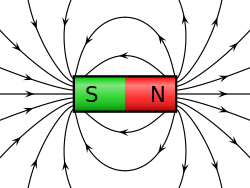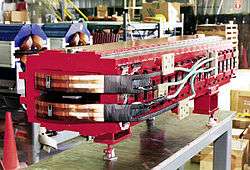Dipole magnet

A dipole magnet is a magnet in which opposite poles (i.e., North and South poles) are on opposite sides of the magnet. The simplest example of a dipole magnet is a bar magnet.
Dipole Magnets in Accelerators


In particle accelerators, a dipole magnet is the electromagnet used to create a homogeneous magnetic field over some distance. Particle motion in that field will be circular in a plane perpendicular to the field and collinear to the direction of particle motion and free in the direction orthogonal to it. Thus, a particle injected into a dipole magnet will travel on a circular or helical trajectory. By adding several dipole sections on the same plane, the bending radial effect of the beam increases.
In accelerator physics, dipole magnets are used to realize bends in the design trajectory (or 'orbit') of the particles, as in circular accelerators. Other uses include:
- Injection of particles into the accelerator
- Ejection of particles from the accelerator
- Correction of orbit errors
- Production of synchrotron radiation
Other Uses
Other uses of dipole magnets include isotope mass measurement in mass spectrometry, and particle momentum measurement in particle physics.
Such magnets are also used in traditional televisions, which contain a cathode ray tube, which is essentially a small particle accelerator. Their magnets are called deflecting coils. The magnets move a single spot on the screen of the TV tube in a controlled way all over the screen.

See also
- Accelerator physics
- Beam line
- Cyclotron
- Electromagnetism
- Linear particle accelerator
- Particle accelerator
- Quadrupole magnet
- Sextupole magnet
- Multipole magnet
- Storage ring